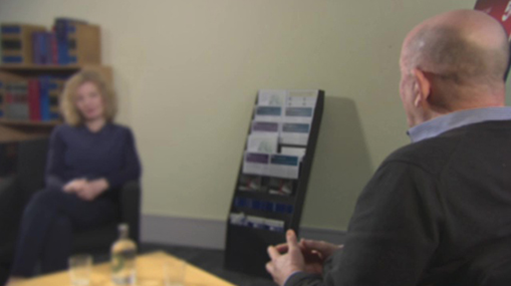5.2 Listening skills
When meeting with your mentees in a face-to-face setting, it is important that your mentee can see that you are giving them your full attention and taking an interest in what they are saying.
Activity 5.4
Watch the video to see an example of effective mentor listening in practice.

Transcript
Good listening transcript
Summarising can be a useful technique to show someone that you have been listening to what they said as well as giving you the chance to check your understanding of key points.
Summarising is particularly beneficial in the following situations:
- When the mentee is getting a bit lost or confused in what they are saying
- When the mentee seems to be losing energy.
- When several subjects are being raised at the same time.
- When the mentor finds themselves getting a little lost or confused (this does happen and you shouldn’t feel bad about this!)
Phrases you may find useful to use when summarising include:
- Can I sum up here: the key facts seem to be ...?
- Can I just check – it sounds as if you are feeling disappointed ...?'
- It sounds as if the principle of fairness is really important to you – have I got that right?
- It seems like the bottom line here is that you want to make a decision sooner rather than later – is that right?
Activity 5.5
The skills of both active listening and summarising are things that you can start to practice in your everyday lives. For example, you might want to try some or all of the following tasks:
- Spend one day each week in which you consciously focus on just one area - look to avoid interrupting the people who you are in conversation with. Whenever you're in a discussion, let the speaker finish his statement before trying to reply. If you absolutely need to interrupt the speaker or maybe raise a point, you have to be patient until you get a chance. The idea here is to remember that improving your listening skills means to stop talking and to pay attention to what others are saying.
- At a time when you are completely alone, start listening to all the sounds around you, identify them one after another. When you notice how your thoughts may start drifting away from the sounds, shift your attention back to the sounds. Keep doing this until you can stay focused on sounds for a minute or longer.
- During at least one conversation that you have each day, practice your skills of focusing completely on that person, don't allow your thoughts to run away, keep your eyes and ears on the person and what they are saying. Ask him/her questions about what they've said and, where appropriate, look to summarise any key pieces of information that they have given you as part of this.
- Get a colleague or friend to talk to you about something of importance to them for five minutes: listen without notes and pay attention to what it is that grabs your attention – which of the categories above do you tune into and which do you hear less clearly?
- Keep a notebook with you and look to write down at least three of the discussions that you have during the course of a day (i.e. what the discussion was, who talked more – you or the other person, what do you now know as a result of the discussion etc.) By writing this down, you should start to get a feel as to what level of listening skills you have at the minute. However, if you keep doing this over a period of time, you should start to see some improvements.
- Record and watch a piece of television news or chat show interview. Having done so, have a go at trying to summarise and repeat the main points of what you have heard, before then playing back the recording to see how accurate you have been.
(Ideas adapted from: http://www.people-communicating.com/ active-listening-activities.html [Tip: hold Ctrl and click a link to open it in a new tab. (Hide tip)] and http://razvandobre.com/ 10-Exercises-to-Improve-Listening-Skills-and-Become-an-Active-Listener.html)
5.1 Communication skills
